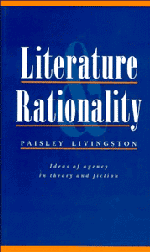Introduction: literature and rationality
Published online by Cambridge University Press: 16 October 2009
Summary
The idea that ‘man’ may be defined as the rational animal is surely an outdated philosophical fiction, a singularly. Western prejudice, perhaps even the Western and sexist prejudice par excellence. Does not the evidence of history – or of even a moment's introspection – flatly refute the notion that human beings are rational? Rationality is the ‘crystal palace’ mocked by Dostoevsky's underground man; real people live in Babel. We can no longer believe in the grand old thesis that human history as a whole is animated by Reason; nor do we have any good reason to think that the preferences of even the most enlightened and lucid modern individuals correspond to the models of rationality invented by neo-classical economics, such as the subjective expected utility model and the theory of rational expectations. It would seem to follow that the concept of rationality does not embrace much of either collective or individual reality, and should therefore be abandoned.
Moreover, even if one were to grant that rationality is a notion having some restricted value in the human sciences, this would not necessarily imply that it has any great relevance to literature. Rationality may seem a particularly inappropriate concept to bring into a discussion of literature: the prevailing tendency today is to associate literature with madness, dreams, and passion, not with reason. The homo sapiens of the sciences, then, is contrasted to the homo demens of literature, particularly in the age of romanticism.
- Type
- Chapter
- Information
- Literature and RationalityIdeas of Agency in Theory and Fiction, pp. 1 - 12Publisher: Cambridge University PressPrint publication year: 1991



